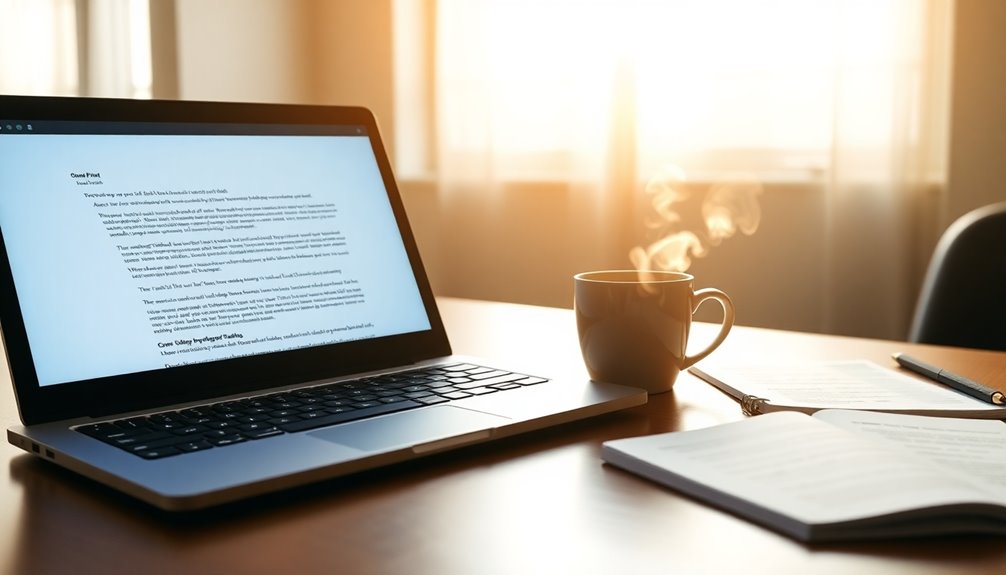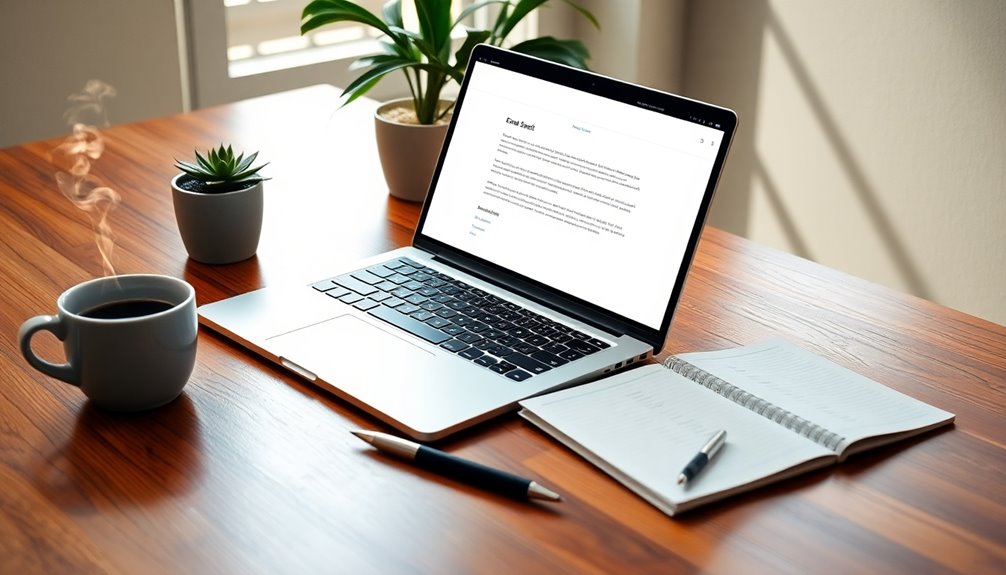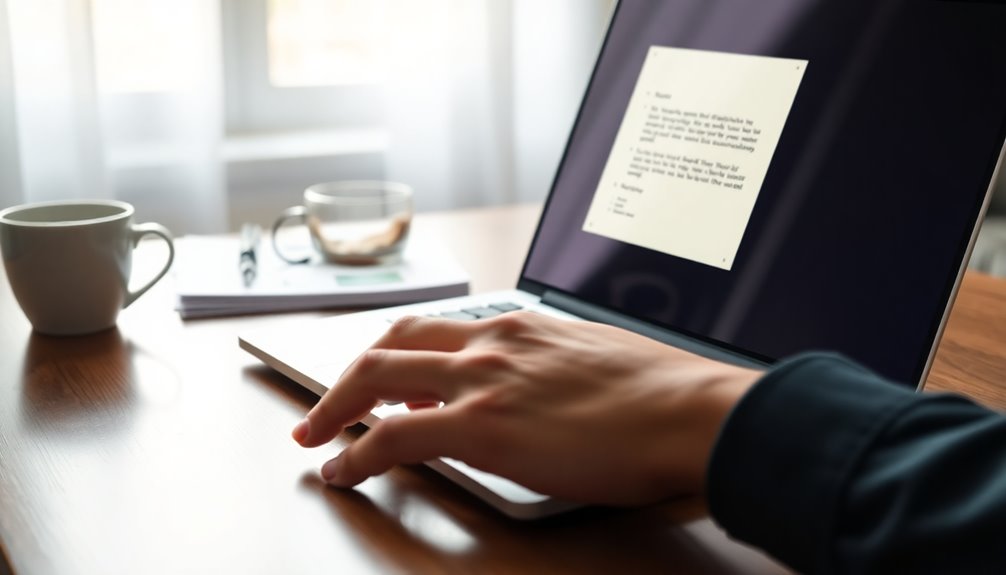To land job offers within 24 hours, focus on crafting an effective follow-up email. Send it 24-48 hours after your interview, and make sure to express genuine gratitude while highlighting key points from your conversation. A strong subject line captures attention, and keeping the email concise boosts engagement. Identify the right contact—typically the hiring manager or one level above. Avoid common pitfalls like generic messages or poor grammar. If you apply these strategies, you'll enhance your visibility and show professionalism. There's more to uncover about this powerful tactic that can elevate your job search success.
Key Takeaways
- Send your follow-up email within 24-48 hours of the interview to show enthusiasm and professionalism.
- Personalize your email by referencing specific points discussed in the interview to reinforce your fit for the role.
- Use a strong subject line that grabs attention, making it easy for the hiring manager to remember you.
- Keep your message concise, ideally 2-3 sentences, to respect the hiring manager's time while still conveying your interest.
- Proofread your email to avoid mistakes, demonstrating your attention to detail and professionalism.
Importance of Follow-Up

Following up after your interview is like planting a seed in the hiring manager's mind—it helps you grow your chances of standing out. In a competitive job search, a thoughtful follow-up email can make a significant difference. About 70% of hiring managers appreciate this gesture, seeing it as a sign of professionalism and genuine interest in the role. By sending a follow-up, you not only show your enthusiasm for your dream job but also increase your visibility to decision-makers.
Many candidates overlook this essential step, making your follow-up a rare yet effective strategy. It gives you an opportunity to clarify any lingering questions that arose during your job interview, showcasing your commitment and proactive approach. This simple act can set you apart from others who neglect to engage post-interview, enhancing your chances of receiving a response. Additionally, reflecting on your past mistakes can help you craft a more impactful follow-up message that resonates with the hiring team.
Timing Your Follow-Up

Timing your follow-up email is essential to making a positive impression after an interview. Ideally, you should send your follow-up within 24-48 hours to maintain momentum and showcase your enthusiasm for the job opportunity. This quick response helps keep you fresh in the interviewer’s mind while demonstrating your readiness. To further maximize the impact of your follow-up email, consider using an effective followup email template. This can help ensure that your message is professional and well-crafted, while also saving you time and effort. A well-written follow-up email can reinforce your qualifications, express gratitude for the interview opportunity, and reiterate your interest in the position.
If you're following up after submitting a job application, wait at least one week. This timeframe allows hiring managers enough time to review submissions, preventing you from appearing impatient. Remember that timing can greatly impact how your email is received; an early follow-up might seem overly enthusiastic, while a delayed one could suggest disinterest.
If the hiring process timeline was discussed during your interview, respect that timeframe. Following up after that specified time shows attentiveness and professionalism. Finally, keep in mind that hiring processes can take up to 11 weeks, so gauge your follow-up timing accordingly. You want to stay engaged without overwhelming the recruiter. By mastering the timing of your follow-up email, you'll enhance your chances of advancing in the hiring process and potentially landing that job offer. Additionally, demonstrating strong communication skills through your follow-up can further impress the hiring team and reinforce your candidacy.
Crafting the Follow-Up Email

Once you've nailed your timing for the follow-up, it's time to focus on crafting a compelling email. Start with a strong subject line like "Excited About the [Position] Opportunity" to grab the hiring manager's attention. In your greeting, express genuine gratitude for the interview opportunity; this sets a positive tone and showcases your professionalism.
In the main body of your email, keep it concise—just 2-3 sentences. Remind the hiring manager of key points from your job interviews, emphasizing your skills and experience that align with the role. This reinforces why you're the ideal candidate.
You might want to reference something specific from your cover letter or the interview that demonstrates your fit for the job. This personalized touch shows you've been actively engaged and are genuinely interested in the position.
Finally, consider adding a P.S. section at the end. This can be a thoughtful note or additional information that may resonate with the hiring manager, further strengthening your candidacy. By keeping your follow-up email focused and engaging, you're more likely to make a memorable impression.
Finding the Right Contact

Finding the right contact can greatly boost your chances of making a lasting impression with your follow-up. Start by identifying the hiring manager or team leader listed in the job posting. This person is often the best point of contact for your email, as they're directly involved in the hiring process. If that information isn't available, platforms like LinkedIn can be invaluable for researching and connecting with the right individuals.
Company directories or official websites usually provide insights into the organizational structure, which can help you pinpoint the most appropriate person to reach out to. It's a good strategy to aim for someone one or two levels above the target role; this shows your initiative and genuine interest in the company's hiring dynamics.
Additionally, understanding common email formats used by the company can enhance the professionalism of your outreach. When you craft your email, be clear and polite, and if you need any assistance, let me know. With the right contact in mind, your follow-up will stand out, increasing your chances of landing that job offer! Moreover, high-quality content in your follow-up email can significantly enhance your credibility and increase engagement.
Common Follow-Up Mistakes

Follow-up mistakes can cost you the job, so it's crucial to steer clear of common pitfalls. Many candidates overlook the importance of tailored communication. Sending a generic follow-up can diminish your chances of standing out, as hiring managers value personalization. Additionally, failing to proofread your follow-up can lead to embarrassing typos that undermine your professionalism.
Here's a quick guide to avoid common follow-up mistakes:
| Mistake | Impact |
|---|---|
| Not following up at all | Missed opportunities |
| Sending a generic follow-up | Lacks professionalism and interest |
| Overly aggressive follow-ups | Perceived as pushy |
| Neglecting proofreading | Creates doubts about attention to detail |
| Ignoring communication preferences | Viewed as inappropriate |
Pay attention to the company's communication preferences and timeline. Respectful follow-up communication shows you're attentive and professional. By avoiding these mistakes, you enhance your chances of leaving a positive impression and ultimately landing the job.
Frequently Asked Questions
How to Know if a Recruiting Email Is Legit?
To determine if a recruiting email is legit, start by checking the sender's email address for the official company domain. Look for personalized details that mention your name and the job you applied for. Be cautious of any urgent language or pressure to respond quickly. Research the recruiter on LinkedIn or the company's website, and never provide sensitive personal information like your Social Security number. Trust your instincts—if it feels off, it probably is.
Why Am I Getting Job Offer Emails?
Imagine you're a contestant on a game show, enthusiastically waiting for the host to announce your prize. That thrill is similar to getting job offer emails. You're likely receiving them because your skills and experiences fit well with what companies need. Your application stood out, and they see potential in you. Plus, your follow-ups may have reinforced their interest. Remember, it's a sign that your efforts are paying off, so keep that momentum going!
Do Employers Send Job Offers by Email?
Yes, employers often send job offers by email. It's a quick and efficient way for them to communicate important details like salary, benefits, and start dates. You'll typically receive these offers within 24 to 48 hours after your final interview, especially if they're enthusiastic to fill the position. This method allows you to review everything carefully, making it easier for you to respond promptly and start the onboarding process.
Why Do Recruiters Ignore Follow up Emails?
Recruiters can sometimes ignore follow-up emails faster than you can say "job offer." They receive countless messages, and if yours isn't personalized or concise, it risks getting lost in the shuffle. Timing's essential, too; send your email too early or late, and it may miss their radar. Don't forget to reference the job you applied for. Specificity helps you stand out, while generic messages often get tossed aside without a second glance.
Conclusion
In the job search, your follow-up email is like a key that opens new opportunities. By understanding its importance, timing your message just right, and crafting a compelling email, you can set yourself apart from the competition. Remember, reaching out to the right contact can make all the difference. Avoid common pitfalls, and you'll be on your way to turning those interviews into offers. So, seize that opportunity and watch doors swing open!









